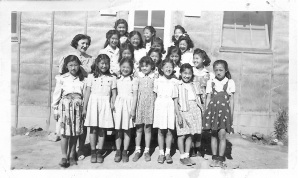The National Park Service News Release of July 11, 2013 is quoted below:
National Park Service director Jonathan B. Javis today announced more than $1.3 million in grants to help preserve and interpret the sites where more than 120,000 Japanese Americans-two-thirds of them U.S. citizens-were imprisoned during World War II.
“Our national parks tell the stories not only of American success, but of our failures such as the dark history of the internment of Japanese Americans during World War II,” Jarvis said, “We make these grants so that present and future generations are reminded what happened and how the people survived these camps. And we make these grants to demonstrate our nation’s commitment to the concept of ‘equal justice under law’ that grew out of these and other civil right experiences.”
ALASKA
Recipient: Parks and Recreation Department of the City and Borough of Juneau, Alaska
Project Title: Empty Chair Project
Grant Award: $80,000
Site(s): Minidoka Relocation Center, Jerome County, ID and Camp Lordsburg Internment Camp, Hidalgo County, NM
Description: The City and Borough of Juneau, Alaska will create a memorial to honor Japanese and Japanese Americans forcibly removed from Juneau and sent to Camp Lordsburg (New Mexico), which was administered by the U.S. Army, and later to the Minidoka Relocation Center. Interviews with survivors and community members will be conducted, and educational materials will be produced relating to the evacuee experience.
The Japanese American Confinement Sites Grant Program supports projects in seven states. Today’s grants bring grant totals to $12 million of the $38 million Congress authorized when it established the Japanese American Confinement Sites Grant Program in 2006.
Grants from the Japanese American Confinement Sites Grant Program may go to the 10 War Relocation Authority camps established in 1942 or to more than 40 other sites, including assembly, relocation, and isolation centers. The goal of the program is to teach present and future generations about the injustice of the World War II confinement and inspire a commitment to equal justice under the law. These are competitive grants with required matches-a dollar of non-federal funds or $2 in-kind contributions for every grant dollar.
The Empty Chair Project Committee is very grateful to receive this national recognition and support.
Here is a link to an article in the Juneau Empire covering the grant award and the ongoing activities of the Empty Chair Project.
http://juneauempire.com/neighbors/2013-07-14/empty-chair-project-receives-grant-80000#.UgBpetnn.rd

